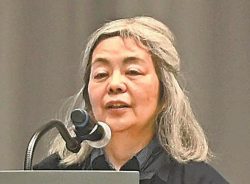Curtain Falls on COP28 Talks: Transitioning Away from Fossil Fuel Gathers Momentum
14:29 JST, December 16, 2023
While the paths to reducing greenhouse gas emissions vary from country to country, the importance of measures against global warming is set to increase in the future. It is highly significant that a number of countries have agreed to accelerate the process of decarbonization.
The COP 28 U.N. climate conference held in the United Arab Emirates has drawn to a close. The outcome document clearly calls for efforts aimed at “transitioning away from fossil fuels in energy systems” and “accelerating action in this critical decade.”
Before the conference began, concerns were voiced over the fact that the COP28 conference was to be held in an oil-producing country that depends on crude oil for its income. Nevertheless, the gathering should be commended for having achieved a certain degree of success.
In recent years, climate talks have tended to focus on fossil fuels, such as coal and natural gas, which emit large amounts of carbon dioxide. At COP26 in 2021, a “phasedown of unabated coal power” was agreed for the first time.
At COP28, a draft proposal was presented calling for the overall “phase-out” of fossil fuels.
Though the “phase-out” phrase was ultimately dropped due to opposition from participating parties including oil-producing countries, it can nevertheless be said that a major step forward was achieved in that “transitioning away” from fossil fuels was agreed upon for the first time, with a decade-long timeframe.
Fears over global warming are swelling in Europe and island nations that face the threat of rising sea levels. Meanwhile, many developing countries still rely on cheap fossil fuels for the majority of their energy needs. This is a fundamental contradiction that has yet to be resolved.
Abnormal climate conditions that cause floods and wildfires are worsening with each passing year. The global warming issue can no longer be left unaddressed; this common understanding among countries likely helped drive the COP28 agreement.
COP28 participants also agreed to triple global output from renewable energy facilities by 2030. Furthermore, the value of nuclear power — which emits no carbon dioxide — was recognized as a low-carbon technology and included in an outcome document for the first time.
It is natural that the use of renewable energy be expanded as far as possible. However, even as solar and wind power usage grows, their inherent weaknesses are increasingly being flagged, such as low output and unstable power generation despite the vast amount of land required by such resources.
Instead of focusing solely on renewable energies, a practical measure for the time being would be to reduce carbon dioxide emissions by expanding the use of nuclear power plants, which have relatively small footprints and can supply electricity in a stable manner.
Moving forward, countries are required to raise their respective greenhouse gas emission reduction targets. Japan, too, needs to continue making further efforts in this regard.
(From The Yomiuri Shimbun, Dec. 16, 2023)
"Editorial & Columns" POPULAR ARTICLE
-

Violations of Subcontract Law: Major Automakers Must Eliminate Old Practices
-

Local Governments’ Tax Revenues: Devise Ways to Correct Imbalances in Tax Sources
-

Heavy Rains in Asia: Support for Victims, Flood-Control Measures Urgently Needed
-

5 Japanese Business Dinner Mistakes to Avoid — and What They Taught Me About Business in Japan
-

New Nuclear Threat: China Seeking to Follow U.S., Russia in Military Expansion
JN ACCESS RANKING
-

Japan’s Hopes for Seafood Exports Shot Down in China Spat
-

Keidanren Chairman Yoshinobu Tsutsui Visits Kashiwazaki-Kariwa Nuclear Power Plant; Inspects New Emergency Safety System
-

Japan to Charge Foreigners More for Residence Permits, Looking to Align with Western Countries
-

Japan Exports Rise in October as Slump in U.S. Sales Eases
-

Niigata Gov. to OK Restart of N-Plant; Kashiwazaki-Kariwa May Be Tepco’s 1st Restarted Plant Since 2011




















